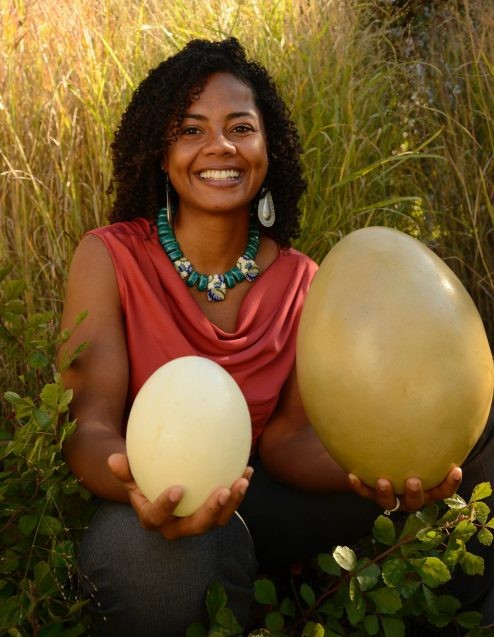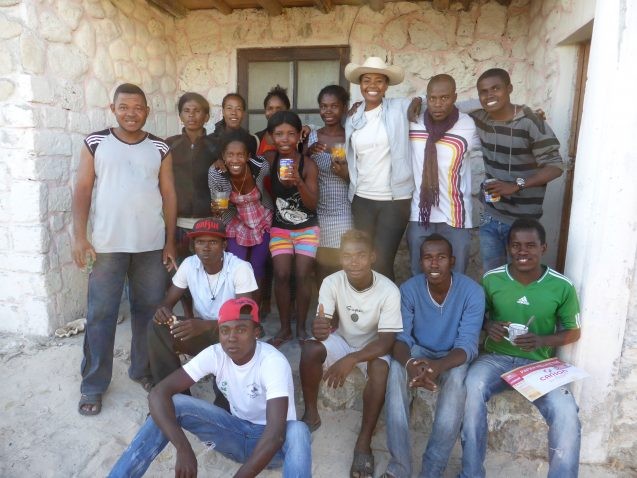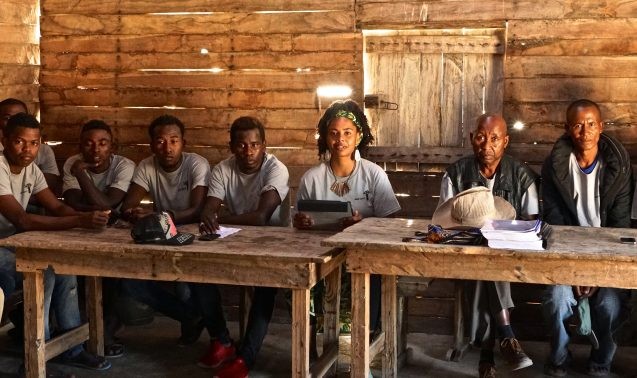Cataloging the Past for Clues to Future Climate Adaptation
A Q&A with archaeologist and anthropologist Kristina Douglass, who studies the evolving relationships between people and the environment.

Kristina Douglass, an associate professor and the first faculty hire for the Columbia Climate School, credits her unconventional upbringing for her interest in archaeology, anthropology, and human-environmental interaction.
Douglass was raised in a family of adoptees. She and her siblings were all adopted from different countries—an experience and way of relating to the world she now says set the stage for her research and career trajectory.
“None of us in my family have shared genetics or culture. We come from all over the world and we grew up moving all over the world because our parents worked in foreign aid and development, and international public health,” she said.
Growing up, Douglass lived in several countries on the African continent and offshore Madagascar, as well as in Ukraine. In these different settings, she became “sensitized very early to the importance of distinct histories and cultures and how they play out in our present-day lives, but also in how we think about the future and how we will deal with issues like climate change and other environmental disruptions,” she said.
Returning to Madagascar as an adult, Douglass has spent more than 11 years directing the Morombe Archaeological Project in the Velondriake Marine Protected Area of southwest Madagascar, an initiative that incorporates archaeological, biological, and paleo-ecological findings to study the evolving relationship between humans and their environment. Douglass was previously the Joyce and Doug Sherwin Early Career Professor in the Rock Ethics Institute and assistant professor of anthropology and African studies at Penn State University.
In the Q&A below, Douglass discusses her career path, ongoing research, and the courses she plans to teach at the Columbia Climate School.
What drew you to your current research combining archeology, anthropology, and climate change?
I was always very aware of how our culture and background shapes who we are and influences the decisions we make. When I look back now, it makes perfect sense to me that I would have found my way, though indirectly, to anthropology and to archeology, both of which allow us to delve into the cultural contexts and longer term histories of different places, and then the knowledge derived from experiences getting passed from one generation to the next.
In the work I’ve been doing in Madagascar, I was really curious about environmental and climate conditions that people respond to and have responded to over many generations—hundreds to thousands of years’ worth of transmission of knowledge. I knew that somehow we needed to make better connections between that past knowledge of human response to climate variability and other changes, and what’s happening today.
Our research there hopes to build a bridge between knowledge from the past, including really deep time knowledge. What’s happening with communities today who are on the front lines of the climate crisis and what can this help us do in the future when we know conditions are going to worsen in many ways, especially for communities who produce a majority of their own food—fishing communities, pastoral communities, agricultural communities. They are going to be most directly impacted and have the least amount of buffer when it comes to intensifying climate change.
A lot of my projects do involve traditional archeological methods like surveys and excavating sites and analyzing the material culture that we recover, but we also rely very heavily on oral histories, technologies like remote sensing and machine learning, and geochemical methods to better understand past environments.
What has been the response of the communities you’ve worked with? How do you foster effective collaboration?
Anthropology and archeology do not have a great track record of being community centered. At worst, there are a lot of experiences in which archeologists and anthropologists have done a lot of harm.
As somebody who was adopted and who moved around a lot, I think the way I operate as a researcher and a scientist is very much tied to that sense of having to find a way to create and become part of communities wherever I go.
This is paired with the fact that, as a graduate student, I felt very much like an imposter in the discipline. I didn’t study any anthropology as an undergraduate. I studied classics and environmental science, and I majored in classical archeology. When I came into the Ph.D. program, I had almost no experience with excavation. Archeology is also a predominantly white field, so there wasn’t really anybody who looked like me. It was difficult to find and identify many mentors who could help me feel like I had a place there.
But the result of that is when I went to Madagascar to start doing reconnaissance for a potential Ph.D. project in 2011, I went in thinking, ‘I don’t know anything. I need to find people who are willing to teach me.’ I knew I wanted to work on Madagascar in part because I had grown up there and I wanted to go back as a professional to tackle some of the questions about environment and how ancient communities had influenced and shaped Madagascar’s really unique environment. I approached people in these local communities as leading experts on the landscape, environment, and cultural and social contexts.
I have built a wonderful set of collaborations with communities in the Velondriake Marine Protected Area in the years since. It’s about 35 different villages in Commune de Befandefa. All the decisions we make about the project are community-driven. I’ve learned that real collaboration involves not only bringing people to the table, so to speak, but also relinquishing power over decision-making and over establishing what the overall goals are.
Of course it’s not a perfect process. In 2019, we wrote a paper together in which we examined critically the degree to which we were a collaborative and community-centered project. It was a really illuminating exercise.

What current initiatives or projects are you most excited about?
One project that is really exciting is the Vezo Ecological Knowledge Exchange. Vezo are communities of fishers on the southwest coast of Madagascar, which many of our collaborators would identify with. This project started as a two-week travel exchange where we got funding internally at Penn State at the time to bring a team of eight delegates from southwest Madagascar to the U.S. We spent one week at Penn State and one week at the Smithsonian.
The idea was, on the U.S. side of the team, we always get this opportunity to go to Madagascar and be hosted by community members there and to work on the project. But then we take our samples and we leave to do analysis, processing, deal with our grants and funding, and work on the publications. What we learned from that self-critique paper was that as soon as the team splits off, that degree of knowledge- and power-sharing drops, and so the project is no longer really collaborative.
With this group of delegates, we were able to create a new level of relationship, to host them in our own homes, to show them the ins and outs of the university and museum settings we work in. We had workshops in a variety of different labs and discussed what kinds of scientific questions could be posed. It was an amazing opportunity to generate new ideas, share and exchange knowledge, and create a new level of transparency in the project. After the trip, we continued with a series of workshops held in Madagascar with the delegates. They’ve now become really important collaborators in terms of community outreach.
Another exciting project is co-led by one of my current post-docs and my former advisee at Penn State, and the team in Madagascar. There’s a lot of talk about having communities adapt to things like climate change using knowledge about what adaptations could work or what initiatives could be implemented, but a lot of times initiatives fail and it’s not clear why. We developed a tool kit in which you solicit a community brainstorm of existing challenges, and you try to find out all the potential opportunities and constraints. And then you generate, collectively with the community, a list of ideas for how those particular challenges could be met in ways that are locally relevant and appropriate. We did the case study in southwest Madagascar in December and ran a number of community workshops, and now we’re writing up the project and trying to publish the toolkit. It’s a very practical instrument that I think will be useful to a wide range of organizations.
We also have a National Science Foundation–funded project, building on previous work through a Carnegie Fellowship I was awarded a couple of years ago, to combine paleoclimate reconstruction with oral history recording and archeology. We’re trying to trace social memory of responses to climate change in southwest Madagascar. For example, if we’re talking to local historians and they tell us that when drought conditions last more than three years in a row, people start to engage in rainmaking ceremonies where they set up altars or particular spaces to encourage the rain to fall. What does that look like? And would traces of those altars preserve in the archeological record? We’re calling those material signatures of human response. Through oral histories, we’ll try to create a long list or database of what these signatures might be and then we’ll use traditional archeological methods, go into deeper time, identify sites that span the last few thousand years, and see if we find any of those material signatures and then if they correspond in any way to the paleoclimate record we have for the area.

What classes are you looking forward to teaching at the Columbia Climate School?
One class I’d like to teach here is Black Ecologies. The way I’ve taught this in the past is to look at deep time examples of how African and Afro-descended peoples have interacted with their environment. We cover topics going as far back as domestication of various plants and animals on the African continent. Then partway through the semester, we cross the Atlantic and we spend time understanding the experiences of Black peoples in the Americas and the Caribbean as they navigated the system of slavery and mercantilism and the extreme environmental injustices that followed. The class is also designed to shine a light on how much of the built and “natural” environment that surrounds us has been shaped by innovations, stewardship of and developments of Black scientists and communities. In that class, we also talk about redlining and issues in urban contexts that have disproportionately impacted Black communities. New York City would be an ideal place to look at this.
I’d also love to teach a class that examines how we know what we know about past climate change, and how can that help us deal with the current climate crisis. How do we know when we reconstruct an accurate climate record? How far back can we extrapolate from one particular climate record in the past? Can the past actually teach us anything of value as we’re facing a pretty unique and far more intense climate crisis today?
What advice would you offer to students who are looking to pursue similar research areas?
Don’t be afraid to focus first on asking the important questions. Sometimes I think students get a little bogged down wanting to learn a technique first and becoming an expert at a particular method, like learning how to do remote sensing or using satellite imagery. That’s a wonderful set of skills to have. But rather than just focusing on that, don’t be afraid to think first about what the questions are that will drive the science. Ideally, they should be community-centered questions, but that’s a separate conversation.
Don’t be afraid to tackle something just because you don’t feel like you have all the expertise needed. The climate crisis and the challenges we face more broadly are going to require superstar teams, and that just means multidisciplinary teams that draw on the diversity of our intellect and skills. Everybody has something of value to contribute and we need to become more comfortable building strong partnerships and collaborations.
